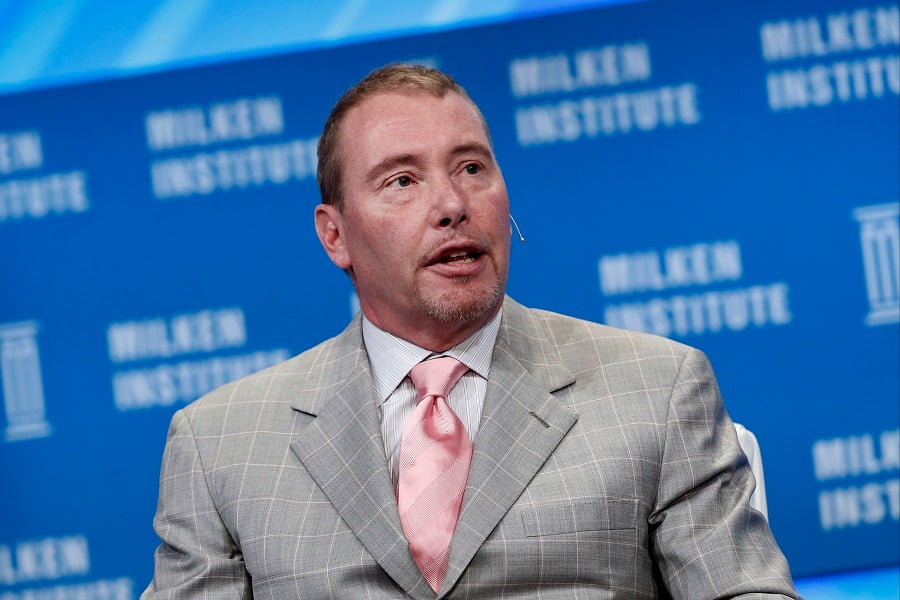Jeffrey Gundlach doesn't see a bright future for unconstrained bond funds, with the notable exception of his own DoubleLine Flexible Income Fund (DFLEX), which he doesn't really identify as unconstrained.
“The category is something of a gimmick, because the strategy sounds nimble, but the allure is really the hope that they will be able to avoid interest-rate risk,” the founder of DoubleLine Capital told
InvestmentNews in a phone interview.
As Mr. Gundlach sees it, the fact that investors are largely being drawn to the category as an interest-rate hedge effectively makes the funds and the portfolio managers more constrained than ever, which set the stage for a discourse last Wednesday on the category and where bond fund investors might be getting it wrong.
On why the category is misleading:
“Unconstrained bond funds are actually constrained in terms of the purpose investors are using them, because if you're running an unconstrained fund you probably know investors are looking to avoid rate risk.
“It's strange, because you're allowed to be unconstrained, yet nobody does it because they know investors are not looking to market-time interest rates, they're looking to sidestep interest-rate risk.”
On why the fact that Morningstar's nontraditional bond fund category averaged a gain of 29 basis points in 2013 while the Barclays US Aggregate Bond Index lost 2.02% says more about credit exposure than interest-rate hedging:
“Some of those funds really shined in 2013 because they are generally avoiding rate risk, and because credit did really well that year. And since it worked that one time, there was enthusiasm for the strategy of being credit-heavy.”
On the category's lagging the Barclays index in 2014 and 2015:
“The hope is that these funds will be positive through a variety of movements, or positive all the time. But those of us who are experienced know that it's impossible to do things perfectly, or even close to perfect, all the time. Just because you can be nimble doesn't mean you can always be positive.”
On whether unconstrained funds can help investors avoid some of the pain of rising rates:
“It really depends on how much rates go up. If rates go up a lot, it's possible that somebody out there will be short the Treasury bond market, and it will be their only allocation. But every time the Fed has started to raise rates, you were better off in Treasuries than in high-yield bonds for a while.
“Rising interest rates lead to losses across the bond category. It's not like these funds are going to have some super-secret bond allocation in credit that goes up when everything else is falling.
“Nothing works all the time, but unconstrained funds give this kind of false promise that they might work all the time. It's not like it's risk-free. It has to be managed almost perfectly.”
On DoubleLine's joining the category with the April 2014 launch of its “flexible” fund that intentionally avoids being described as unconstrained:
“It was my feeling that those unconstrained funds would eventually get a bad name. Our flexible fund is spoken about to investors as trying to navigate the bond market and stay positive.
“When you're running funds, there's a lot to consider, including what investors are looking for. It is clear that investors don't want rate risk right now. There will be a time when we will go on the offensive in our flex fund, and we will probably go to a very high duration someday.”
Why Treasury Inflation-Protected Securities are a sucker's bet inside an unconstrained bond portfolio:
“A lot of funds gravitate to TIPS under the assumption that they will do well in rising rates, but that only works if inflation is going up fast. They have a very long duration. Unless inflation is truly moving higher in a very discernible way, TIPS are just long duration.”
On what the appeal of unconstrained funds says about active management:
“In the equity markets people don't seem to believe in active management anymore, and yet in their bond portfolios they believe in uber-active management. So they go toward strategies that are as nimble as possible, so that must mean active management is great.
“It goes back to the active-passive pendulum. In 2015 you did better in an ordinary index fund than you did in an unconstrained bond fund. The category won't go away completely, but most of the funds are shrinking.”







